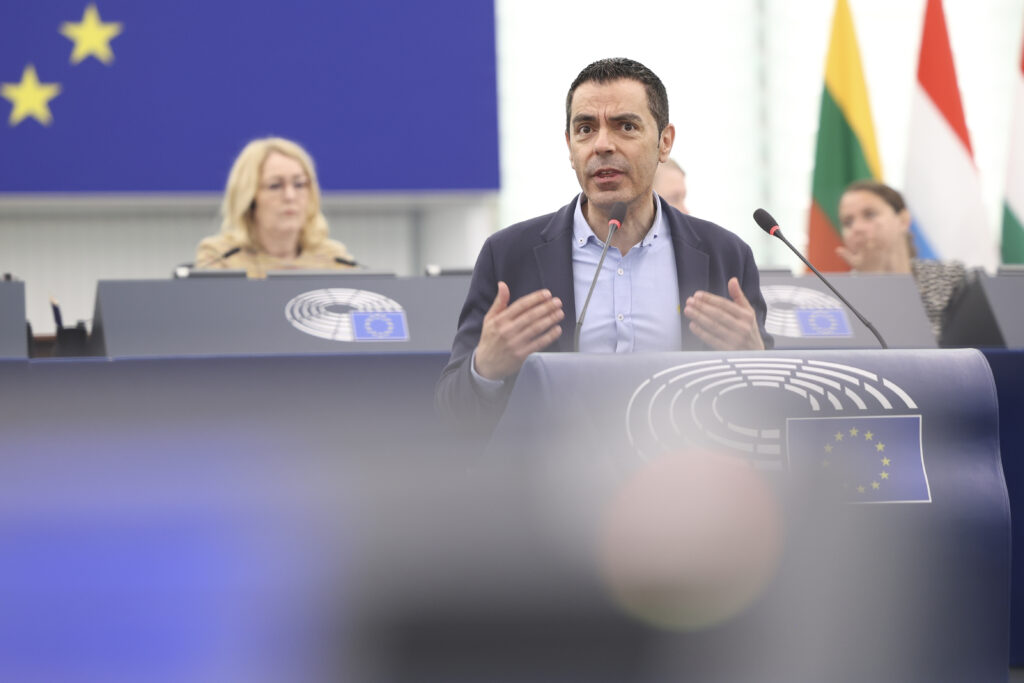Europe is facing a deepening housing crisis. In 2023, nearly one in ten Europeans spent over 40 per cent of their disposable income on housing, the EU’s threshold for housing cost overburden. An average housing price surge of 48 per cent since 2015 has put decent dwellings out of reach for many Europeans. Public investments alone will not be enough to solve this crisis, MEPs argued in this week’s session of the Special Committee on the Housing Crisis in the European Union.
Housing is “one of the most pressing challenges”, according to committee Chair Irene Tinagli (S&D/IT). She emphasised that, especially as the housing crisis coincides with other major goals such as the EU’s climate ambitions, public funding alone is not enough. Innovative financial models and private sector involvement are essential to provide housing for all Europeans. Public-private partnerships, or PPPs, she argued, are key to mobilizing sufficient resources for affordable housing. However, significant challenges remain, particularly in aligning private sector interests with societal needs.
No single actor can solve this
MEP Marcos Ros Sempere (S&D/ES) similarly underlined how the housing crisis is connected to multiple overlapping crises. With general price levels still rising, construction costs are expected to continue to climb, likely leading to a further reduction in housing supply. At the same time, there is a growing trend of real estate being acquired for commercial purposes, which drives up rents and exacerbates affordability issues. “This cannot be solved by this committee alone, nor with a silver bullet,” Mr Ros cautioned.
As a member of the Committee on Regional Development, Mr Ros highlighted the parallel efforts underway. The committee recently published a report addressing the housing crisis through the lens of cohesion policy—the EU’s main investment tool for reducing regional disparities. The report proposes changes to existing regulations in order to broaden the investment scope of EU cohesion funds. Currently, these funds can only be used for social housing and the energy renovation of homes. The report proposes broadening the scope of the cohesion policy to include affordable housing—not just social housing—as an area of investment.
Revising cohesion funds for housing
The report also emphasises that housing stock must not only be affordable, but also of high quality and energy efficient, and that these goals should become core objectives of the cohesion funds. The formal review process is still underway, expected to be voted on during the September plenary session. The European Commission, however, has already adopted some of the report’s recommendations.
Similarly,addressing the issue with attention to regional disparities, MEP Klára Dostálová (PfE/CZE) stressed the need to primarily address the housing crisis in areas most affected by shortages: “Scarcity drives up cost. Therefore, kickstarting construction in regions facing housing shortages would contribute to improved accessibility. The scale of the housing crisis in some European regions demands pragmatic and flexible solutions. We must create conditions that incentivise private investment while ensuring that housing remains affordable and accessible. Also public-private partnerships can play a crucial role in regions struggling with housing affordability. Efficient EU-level support should help member states leverage private investment without being held back by rigid state aid rules or excessive red tape. This is not about ideology—it’s about getting homes built where they are needed most.”
You might be interested
European Investment Bank
Crucial in the financing of the PPPs is the European Investment Bank, which has already provided €15.6bn in housing investments between 2020 and 2024 across 12 member states. Mark Derycke, Principal Adviser at EIB explained that the bank focuses exclusively on non-market housing—from emergency shelters to social and affordable housing—through direct loans to private developers and risk-sharing models.
The EIB focuses on projects that utilise existing land, avoiding the need for new land acquisition. The institution sees tax benefits and competition-based procurement procedures as important tools to ensure fairness, transparency, and cost-effectiveness.
Two major PPP models to attract private capital are currently in use, the concession model and the availability-based model. In a concession, the private partner is responsible for financing, building, and maintaining the housing, and earns its revenue directly from tenants’ rent payments. This means the private partner carries both the construction risk and the demand risk—if fewer tenants come than expected, the revenue drops.
Attracting private capital
In contrast, in an availability-based PPP, the public authority collects the rent and pays the private partner a fixed fee based on the availability and performance of the housing units. In this model, the private partner still bears the construction risk but not the demand risk, making it less financially volatile. Both models are already in operation in several member states.

Rui Reis, who represented the Portuguese Housing Department in the meeting, explained how Portugal uses a system that offers private partners an exit strategy by allowing the transfer of their contractual position. This approach helps mitigate the risks they bear and makes it more attractive for them to commit to such projects.
Pitfalls of public-private partnerships
While it is widely acknowledged that private investment is crucial to meeting the societal need for affordable housing, major challenges remain. These stem largely from the tension between the profit-driven objectives of the private market and the social function of housing. For this reason, Mr Ros stressed that when public funds are used—whether for new housing projects or for building renovations—it must be ensured that these homes remain under public management. “They must not fall into the hands of the free market,” he warned.
MEP Gabrielle Bischoff (S&D/GE) echoed these comments: “It is very important that more money is invested in housing, the needs and investment gaps are huge. Innovative models like cooperatives can play an important role here, and should be further explored. When it comes to public-private partnerships, it is important that public funds are used in the most efficient way and where the real needs are. They should not end up as additional profit of private companies.”
MEP Leila Chaibi (The Left/FR) proved more skeptical about the private sector’s ability to solve the housing crisis. Public-private investment is a tool, but cannot be the main solution for tackling the housing crisis. “The priority must be on allowing public investments to be made on public and social housing. One of the main reasons for the actual housing crisis is the financialisation of the market, where investment funds and private actors have turned homes into assets for profit. As long as we keep relying on the private sector, we will keep deepening the crisis. Housing is a fundamental right. We must break with the market logic. Only public control can guarantee affordable, dignified, and climate-resilient housing for all.”
Role of banks
The tension between public control and private profit also raises the question of how financial institutions can be steered toward long-term, socially responsible investment. As Kitty de Heiden, director of personal and private banking at the ‘ethical’ Triodos Bank, pointed out, banks can—and should—be more than passive funders.
She warned that housing should not be treated merely as an investment opportunity. “Living is a fundamental right, not a financial instrument,” she said, warning that current trends prioritise returns over societal need.
As a result, new housing developments do not necessarily increase access to suitable homes, as the actual needs and the profitability objectives are often mismatched. Ms de Heiden pointed to the Netherlands, where single-family houses continue to dominate new construction, even though smaller apartments are in higher demand. The reason, she explained, is simple: Investors tend to prioritise building what yields higher profits rather than what meets actual housing needs.
Living is a fundamental right, not a financial instrument.
To counter this trend, she explained that Triodos implements several measures to prioritise the real needs of the housing market over investors’ interests. For example, the bank does not provide mortgages for the purchase of second homes. Additionally, homeowners can access a ten-year, interest-free loan to invest in making their homes more sustainable.
Making better use of existing homes
Part of addressing the housing crisis is also about using the existing housing stock more efficiently. Promoting co-housing could be an important step in this direction, although tax and legal barriers currently discourage such arrangements.
Another way to improve efficiency is by supporting the sustainable renovation of existing homes—not just new ones. Ms De Heiden, therefore, recommended amending the Mortgage Credit Directive, the EU legislation that sets rules for home loans across the Union. A revision could make it easier for homeowners to access financing for sustainability upgrades, enabling broader and fairer participation in the energy transition.
Balancing private and public needs
Several members warned against leaning too far into financial logic at the expense of the public good. Marko Vešligaj (S&D/CRO) stressed that “housing policy should be based on the principle of the right to housing—it is a basic, fundamental right and must not be determined by private interests”. He warned that PPPs can only be considered successful if they meet clear criteria, including a defined public interest and a strong focus on affordability. “Perhaps it sounds like a utopia to many of our citizens, because we are faced with a reality where the focus is on generating profit. That’s why we must define the rules and make sure affordability and public responsibility come first.”
MEP Oihane Agirregoitza (Renew/ES) echoed these concerns, emphasizing the urgent need to increase housing supply. She called for frameworks that incentivise private developers to invest in public affordable housing, while striking a careful balance between free-market dynamics and public safeguards to broaden access to the market.
Looking ahead
Looking ahead to the EU’s next budget cycle (2028–2034), Mr Ros called for stronger prioritisation of investment in housing, including the creation of a dedicated fund for public housing stock. He emphasised that future investments should go beyond affordability to address broader goals, such as energy efficiency—as required under the EU’s Energy Performance of Buildings Directive—and resilience to natural disasters. In addition to technical standards, he underlined that European values such as functionality, beauty, inclusion, and long-term affordability must guide housing policy.
The Commission plans to present an Affordable Housing Plan next year. It is also exploring reforms to simplify construction rules in order to bring down costs for both new builds and renovations.











